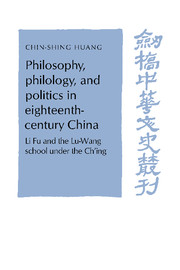 Philosophy, Philology, and Politics in Eighteenth-Century China
Philosophy, Philology, and Politics in Eighteenth-Century China Book contents
- Frontmatter
- Contents
- Foreword by Professor Ying-shih Yü
- Acknowledgments
- Abbreviations
- Introduction
- 1 The original argument (1): “Chu Hsi versus Lu Hsiang-shan” (Chu-Lu i-t'ung): A philosophical interpretation
- 2 The original argument (2): Wang Yang-ming and the problematic of “Chu Hsi versus Lu Hsiang-shan”
- 3 The critical dimension in the Confucian mode of thinking: The conception of the Way as the basis for criticism of the political establishment
- 4 Li Fu: an exemplary Lu-Wang scholar in the Ch'ing dynasty (1): His life
- 5 Li Fu: an exemplary Lu-Wang scholar in the Ch'ing dynasty (2): His thought
- 6 Li Fu and the philological turn
- 7 The price of having a sage-emperor: the assimilation of the tradition of the Way by the political establishment in the light of the K'ang-hsi emperor's governance
- Conclusion
- Chinese glossary
- Bibliography
- Index
Conclusion
Published online by Cambridge University Press: 17 September 2009
- Frontmatter
- Contents
- Foreword by Professor Ying-shih Yü
- Acknowledgments
- Abbreviations
- Introduction
- 1 The original argument (1): “Chu Hsi versus Lu Hsiang-shan” (Chu-Lu i-t'ung): A philosophical interpretation
- 2 The original argument (2): Wang Yang-ming and the problematic of “Chu Hsi versus Lu Hsiang-shan”
- 3 The critical dimension in the Confucian mode of thinking: The conception of the Way as the basis for criticism of the political establishment
- 4 Li Fu: an exemplary Lu-Wang scholar in the Ch'ing dynasty (1): His life
- 5 Li Fu: an exemplary Lu-Wang scholar in the Ch'ing dynasty (2): His thought
- 6 Li Fu and the philological turn
- 7 The price of having a sage-emperor: the assimilation of the tradition of the Way by the political establishment in the light of the K'ang-hsi emperor's governance
- Conclusion
- Chinese glossary
- Bibliography
- Index
Summary
This study has used the Lu-Wang school to explore two major themes: the change in intellectual climate from the Sung to the early Ch'ing, and the Ch'ing regime's assimilation – largely through the efforts of the K'ang-hsi emperor – of the tradition of the Way.
The Lu-Wang school has been chosen as the focus of this study. In contrast to its rival, the Ch'eng-Chu school, the Lu-Wang school had, an independent spirit toward book learning and was never supported by the political powers as the holder of official doctrines. In the final analysis it appears that the Lu-Wang school was better suited than the Ch'eng-Chu school to reflect the depth and breadth of these themes. Though initially detached from book learning, the school was influenced by the fashion of evidential study in the early and middle Ch'ing. Despite that the Lu-Wang school never received formal political patronage, it adapted quite easily to the rule of the alien Ch'ing regime. That Li Fu would be both a Lu-Wang scholar and a high-ranking official is a clear example of this.
As a Lu-Wang scholar, Li Fu depreciated the importance of book learning. However, in order to convince his contemporaries of the truth of Lu-Wang doctrines, he was compelled to use arguments based on an evidential research. The discrepancy between means and ends in Li Fu's expression can be grasped only through an understanding of his intellectual context. Scholars of the time were generally hostile to metaphysical speculation.
- Type
- Chapter
- Information
- Philosophy, Philology, and Politics in Eighteenth-Century ChinaLi Fu and the Lu-Wang School under the Ch'ing, pp. 169 - 172Publisher: Cambridge University PressPrint publication year: 1995


